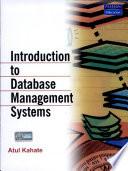The book is intended to provide an insight into the DBMS concepts. An effort has been made to familiarize the readers with the concepts of database normalization, concurrency control, deadlock handling and recovery etc., which are extremely vital for a clear understanding of DBMS. To familiarize the readers with the equivalence amongst Relational Algebra, Tuple Relational Calculus, and SQL, a large number of equivalent queries have been provided. The concepts of normalization have been elaborated very systematically by fully covering the underlying concepts of functional dependencies, multi-valued dependencies, join dependencies, loss-less-join decomposition, dependency-preserving decomposition etc. It is hoped that with the help of the information provided in the text, a reader will be able to design a flawless database. Also, the concepts of serializabilty, concurrency control, deadlock handling and log-based recovery have been covered in full detail. An overview has also been provided of the issues related to distributed-databases.
The book is intended to provide an insight into the DBMS concepts.









